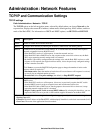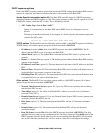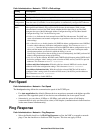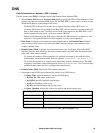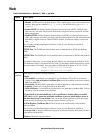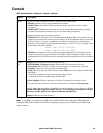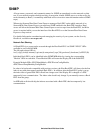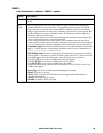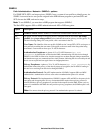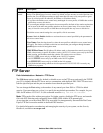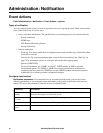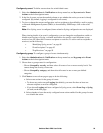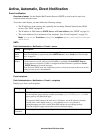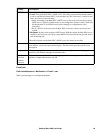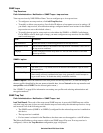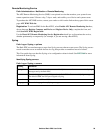
Switched Rack PDU User Guide89
SNMPv3
Path: Administration > Network > SNMPv3 > options
For SNMP GETs, SETs, and trap receivers, SNMPv3 uses a system of user profiles to identify users. An
SNMPv3 user must have a user profile assigned in the MIB software program to perform GETs and
SETs, browse the MIB, and receive traps.
Note: To use SNMPv3, you must have a MIB program that supports SNMPv3.
The Rack PDU supports SHA or MD5 authentication and AES or DES encryption.
Option Description
access SNMPv3 Access: Enables SNMPv3 as a method of communication with this device.
user
profiles
By default, lists the settings of four user profiles, configured with the user names apc snmp
profile1
through apc snmp profile4, and no authentication and no privacy (no encryption). To
edit the following settings for a user profile, click a user name in the list.
User Name: The identifier of the user profile. SNMP version 3 maps GETs, SETs, and traps to a
user profile by matching the user name of the profile to the user name in the data packet being
transmitted. A user name can have up to 32 ASCII characters.
Authentication Passphrase: A phrase of 15 to 32 ASCII characters (apc auth
passphrase, by default) that verifies that the NMS communicating with this device through
SNMPv3 is the NMS it claims to be, that the message has not been changed during transmission,
and that the message was communicated in a timely manner, indicating that it was not delayed and
that it was not copied and sent again later at an inappropriate time.
Privacy Passphrase: A phrase of 15 to 32 ASCII characters (apc crypt passphrase, by
default) that ensures the privacy of the data (by means of encryption) that an NMS is sending to
this device or receiving from this device through SNMPv3.
Authentication Protocol: The APC implementation of SNMPv3 supports SHA and MD5
authentication. Authentication will not occur unless an authentication protocol is selected.
Privacy Protocol: The implementation of SNMPv3 supports AES and DES as the protocols for
encrypting and decrypting data. Privacy of transmitted data requires that a privacy protocol is
selected and that a privacy passphrase is provided in the request from the NMS. When a privacy
protocol is enabled but the NMS does not provide a privacy passphrase, the SNMP request is not
encrypted.
Note: You cannot select the privacy protocol if no authentication protocol is selected.



